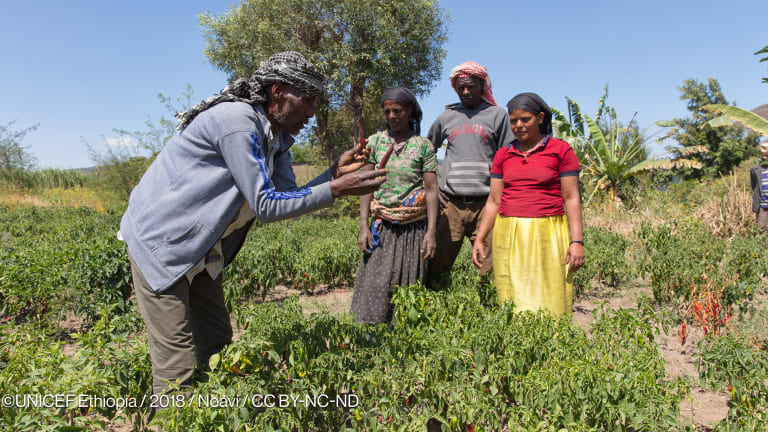
On Dec. 30, following three consecutive years of drought in Zimbabwe, the World Food Programme issued a plea for the international community to support the country. WFP plans on doubling the number of people it assists there and hopes to raise over $200 million to import food from various other nations.
This sort of news out of Africa contributes to the single story: that the continent cannot feed itself and is dependent on the rest of the world for succor and survival. However, what this single story excludes is the vibrant and active entrepreneurial ecosystem that provides food within Africa. It also fails to reveal the dangers of international interventions, ones that often crowd out the African private sector and create distortions.
This must change. Instead of importing nutritious food into African countries facing a food crisis, humanitarian and development agencies should prioritize engagement and partnership with the local private sector.
Consider the findings of the “Africa Agriculture Status Report 2019,” published by the Alliance for a Green Revolution in Africa, which stated that the private sector handles 80% of the food consumed on the continent. Referred to in the report as the “hidden middle,” these companies are the drivers of growth and innovation, providing the inputs, logistics, processing, distribution, and retailing of food, sourced locally.
Consider Monica Musonda of Java Foods and Ram Ray Vijayvargiya of Seba Foods, who are both producing nutritious food in Zambia. They source their grains locally and build the capacities of smallholder farmers, thereby directly contributing to increasing efficiencies in the soybean and maize value chains and improving the livelihoods of smallholder farmers in Zambia.
There are many African entrepreneurs who support the landscape, by providing inputs such as seeds, fertilizer, and equipment, while others supply training, financing, insurance, and logistical and storage support. Many leverage digital tools and innovations. In fact, according to CTA’s “Digitalisation of African Agriculture Report, 2018-2019,” there are at least 390 distinct, active “digitalisation for agriculture” solutions across the continent. Kenya has over 80% of its farmers registered and is home to 20 of the largest solutions. Zimbabwe and other countries hit by drought also currently leverage these solutions, which are connecting farmers to markets, reducing the transaction costs, enhancing traceability and transparency, and increasing the competitiveness of the sector. Many of these innovations can predict droughts and help farmers and stakeholders across critical value chains institute climate mitigation strategies.
Entrepreneurs largely operate in isolation, with very limited support from their governments and in very difficult operating environments. The majority of them do not work with international development agencies and have not been engaged by WFP and other humanitarian agencies looking to address the food crises in Africa.
In fact, in some countries, they are being crowded out, especially when large inflows of food aid find their way back into the local markets, often at rock-bottom prices. The limited coordination between international development organizations and the local private sector is also linked to the reluctance of some African governments to foster and enforce lines of communication and active collaborations, and it is connected to pressure from the funders — usually countries in Europe and North America — to source from their home countries.
Thankfully, there are a few exceptions to this trend, such as Africa Improved Foods in Rwanda, which began operations in December 2016 and is already supplying Super Cereal products to the World Food Programme. A public-private partnership with investments from the government of Rwanda, DSM, IFC, CDC Group, and FMO, AIF proudly sources its grains from Rwanda and neighboring countries. The Rwandan government, as an investor in the company, has also created an enabling environment for AIF and actively supports its engagement with the World Food Programme. This example reveals what is possible when governments, international organizations and the private sector work collaboratively.
There is clearly a need for more success stories on the continent of companies that are scaling and filling critical gaps in the food ecosystem. However, these companies need to be identified and supported. The hub nourishingafrica.com, launched in December of last year, showcases these entrepreneurs and their companies. It is envisioned as an online home that attracts, empowers, equips, connects, and celebrates over 1 million dynamic and innovative entrepreneurs who will drive the profitable and sustainable growth of the African agriculture and food landscapes. This hub provides linkages to funding sources, talent, knowledge and e-learning, and markets. It is just one example of the momentum that is building on the continent to promote more food self-sufficiency.
Climate change, extreme weather temperatures, droughts, and flooding will continue to challenge the global food ecosystem in 2020 and beyond. As a result, it is imperative that African governments — and the international development agencies they engage — recognize and embrace the rise of African food entrepreneurs and the role that they are playing in driving food innovation on the continent. By sourcing locally and sharing best practices, knowledge, and funding, they can empower the private sector and local NGOS to address their own crises. This will not only reduce the cost of interventions, curb the number of international staff they must bring in, and ensure more sustainable ecosystems, but will also foster greater local ownership and resilience in the medium and long terms.








